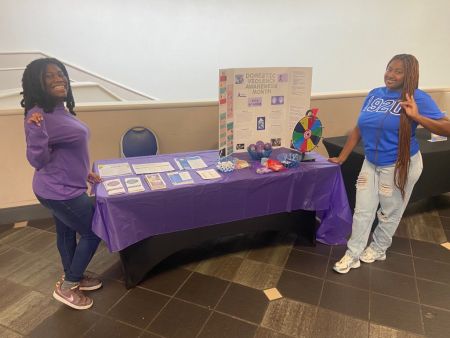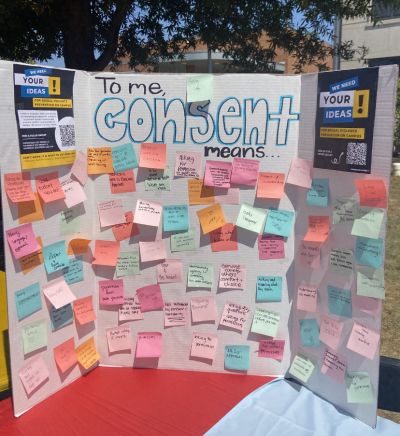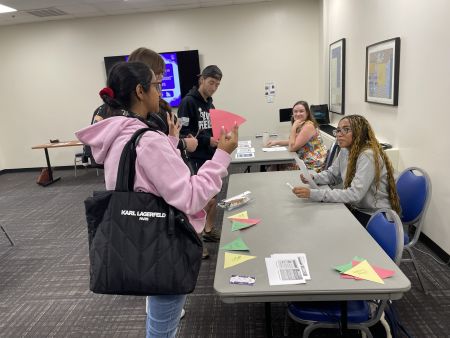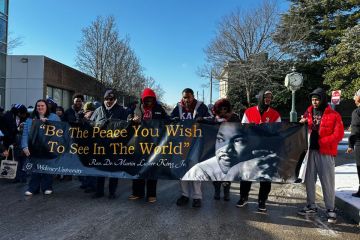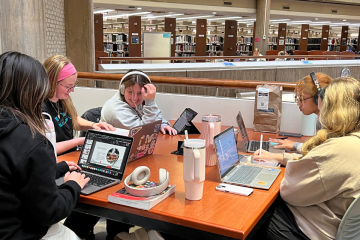Making Waves: Widener Rolls Out New, Comprehensive Sexual and Relationship Violence Prevention Program
It doesn’t have to happen here.
That’s the underlying message of Widener Anti-Sexual Violence Education, or WAVE, a new comprehensive and strategic program designed to engage the campus community in preventing sexual assault, dating and domestic violence, and stalking.
Sexual assault and violence prevention efforts at Widener are not new. But WAVE, currently funded by a $400,000 federal grant awarded in 2023 by the Office on Violence Against Women, is committed to bringing together voices and perspectives from across campus – including, and especially, students – with the goal of providing people with the tools and skills needed to change culture.
“We’re thinking about this holistically,” said Jamie O’Leary, associate director for violence prevention education, who was brought on to steer the program. “WAVE includes undergraduate and graduate students, faculty and staff, and external partners, including victim service organizations.”
These conversations are not always easy or comfortable, but “we need to embrace the uncomfortable to get things done. A lot of things happen because we don’t pay attention,” said Taylor Holmes ’28, a social work major.
Holmes is one of about 100 students working on WAVE, bringing their all-important perspectives to the table and providing real weight and support for the initiative.
O’Leary said WAVE is also placing “thoughtful, inclusive, and specific” emphasis on addressing how sexual and relationship violence disproportionately impact the LGBTQ+ community, and WAVE is partnering with the Mazzoni Center of Philadelphia to develop LGBTQ+-focused programming. WAVE is also working to counter stereotypes and erroneous assumptions that all victims are women and all perpetrators are men.
WAVE’s approach to violence prevention will include:
- Coordinated Community Response Team, or CCRT: A coalition of students, faculty, staff, and community partners working to enhance violence prevention and response on campus. The Widener CCRT mission is to create a culture where consent is centered, survivors are supported and valued, and sexual violence – including domestic violence, dating violence, sexual assault, and stalking – is not tolerated in person or online.
- Comprehensive Prevention: A multi-strategy educational initiative that meets students where they are, with various touchpoints across campus and throughout their college journeys. The goal is to deepen student understanding of dating / domestic violence, sexual assault, stalking, and the reporting processes; to cultivate skills around consent, healthy relationships, and bystander intervention; and provide education that is representative of and engaging for students of all genders and backgrounds, with a focus on the varying needs of communities most impacted by violence and oppression.
Widener will also assess and enhance current policies and procedures for addressing sexual and relationship violence incidents, including better conveying the reporting process and increasing understanding of policies among students, faculty, and staff. - Law Enforcement: WAVE will provide ongoing training to Campus Safety in collaboration with community-based victim service providers, as well as strengthen and better publicize partnerships with confidential off-campus resources, including Delaware County Victim Assistance and the Domestic Abuse Project of Delaware County.
Sexual assault awareness and prevention topics are typically addressed in college new student orientation programs. But it often stops there. WAVE is focused on changing that by providing ongoing training, workshops, classroom-based education, and other opportunities for students to build skills, as well as for messaging to be reinforced and enhanced.
To that end, WAVE is partnering with faculty, student groups, Athletics, Fraternity & Sorority Life, Student Living, the Office of Student Inclusion and Belonging, Student Engagement, and others.
“We want to create a sexual violence prevention program that doesn’t just begin and end at orientation. We’re creating touchpoints so at some point, each year, students will engage with these ideas in some way,” said Annalisa Castaldo, professor of English and co-chair of the CCRT.
The foundation of WAVE is students. To date, students have gotten involved as research assistants, social media assistants, members of the Bystander Intervention Working Group, and in other roles. Student focus groups and surveys have also provided key insights, and student voices continue to drive programming.
Holmes, who is serving as one of WAVE’s new student research assistants, joined the initiative because “I wanted to make a difference. I care about people and want to put students first, so they do not feel like a number. I want to spread positivity. And WAVE needs to know the audience and what’s the vibe and feel of campus.”
This is essential to success, said Kortne Smith, assistant director in the Office of Student Inclusion and Belonging, who is working with WAVE’s CCRT and Bystander Intervention Working Group. Smith is also helping to connect WAVE to multicultural and faith-based student organizations on campus.
Students, said Smith, are living these experiences and need tools that work for the realities on the ground.
“We have to have student buy-in to impact culture. We have to elevate student voices,” said Smith. “No matter what program we put together or how great it is, if we’re not giving them the tools that make sense for their lived experiences it’s not going to land and we’re going to miss the mark. They need real tools they can implement in real life.”
While WAVE is currently grant-funded, Widener is committed to continuing these efforts past the grant, and WAVE is being built with a focus on sustainability.
Access WAVE resources for current students
***
Disclaimer: This project was supported by Grant No. 15JOVW-23-GG-04487-CAMP awarded by the Office on Violence Against Women, U.S. Department of Justice. The opinions, findings, conclusions, and recommendations expressed in this publication are those of the author(s) and do not necessarily reflect the views of the U.S. Department of Justice.

